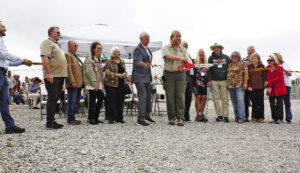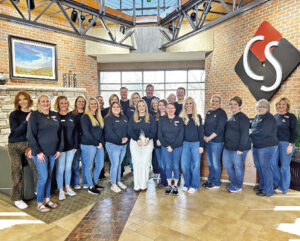With only seven of Carroll County’s 11 justices of the peace in attendance, a proposed ordinance to regulate large-scale industrial projects failed to gain the six votes needed for passage on its first reading.
The proposal, sponsored by District 3 JP Harrie Farrow, would have created “a plan submission process” for large-scale industrial projects in the county. It would require developers to submit plans for any industrial project encompassing more than five acres of private land, with exemptions for farming, ranching and other “non-industrial” projects.
While the proposed ordinance stipulates that it does not give the county the authority to deny the legal use of private property, it does outline “violations” and “penalties.”
The violations outlined in the proposal include falsifying reports, beginning construction before receiving clearance from the county and deviating from the submitted plans.
The proposal would establish penalties of $1,000 for each violation and $500 per day for ongoing violations.
Farrow’s proposal, which could be brought back to the quorum court table, is the latest in a series of measures that appear to stem from Scout Clean Energy’s plans to construct an industrial “wind farm” southeast of Green Forest, comprising wind turbines standing several hundred feet tall.
Scout, based in Boulder, Colo., plans for the wind turbine project to expand over approximately 9,000 acres — about 14 square miles — in Carroll County, much of it along County Road 905. Scout says the project could generate up to 180 megawatts of electricity at peak demand — enough, the company says, to power almost 30,000 homes. Scout says it has signed lease agreements with more than 50 landowners to place wind turbines on their property. The company estimates that the 30-year project will generate more than $14 million in lease payments and $25 million in tax revenue for the county.
The planned project has drawn vigorous opposition from opponents who say it will be harmful to wildlife, have adverse health effects and pose a potential safety risk for humans and potentially cause significant damage to county roads, along with disturbing the natural beauty of the area and having a negative effect on tourism. Opponents of the project also say Scout’s ownership can be traced to Chinese interests.
JPs have said they can do little to prevent the project from moving forward, with some saying they don’t want to interfere with the rights of individual property owners. Others, including Farrow, have pushed for measures to provide at least some degree of regulation of the project.
Four proposed ordinances that would have imposed setback regulations on industrial towers in the county all have failed to gain approval from the quorum court.
At the April 16 meeting, Farrow voted in favor of her proposal along with District 1 JP Jack Deaton, District 2 JP Bruce Wright, District 7 JP Kellie Matt and District 10 JP Jerry King. District 6 JP Craig Hicks and District 11 JP John Howerton voted against the proposal. District 4 JP Hunter Rivett, District 5 JP Matt Phillips, District 8 JP Francisco Pedraza and District 9 JP Roger Hall were absent.
The quorum court’s next regular meeting is scheduled for 5 p.m. Tuesday, May 21, in the courtroom of the Eastern District Courthouse in Berryville.


